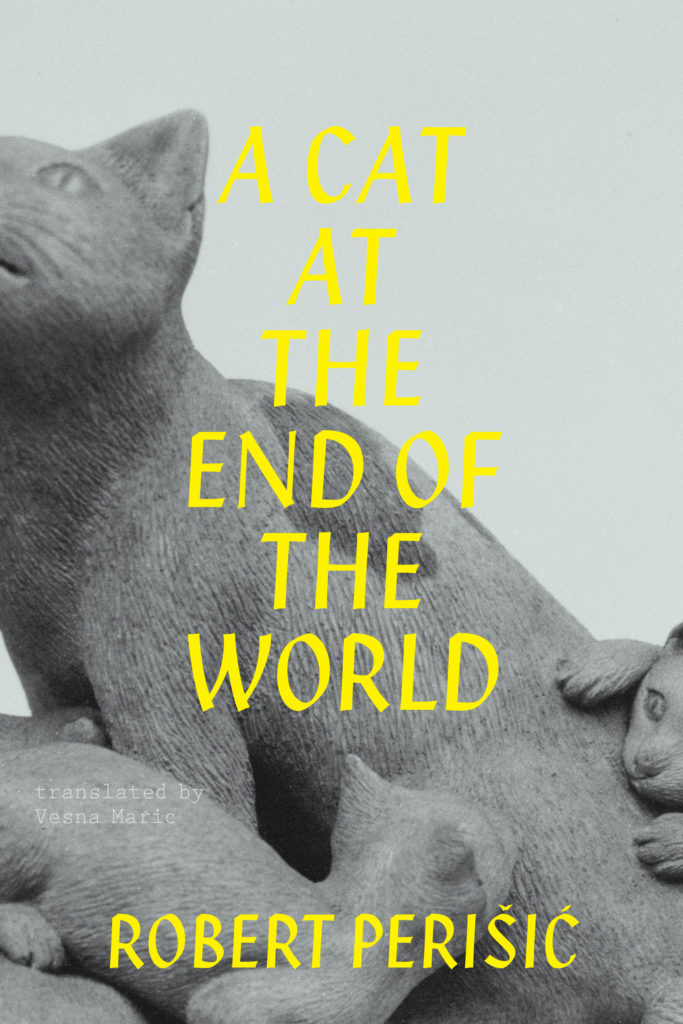
We’re pleased to be publishing Nell Zink’s introductory letter for Robert Perišić’s forthcoming novel A Cat at the End of the World. Translated by Vesna Maric, Perišić’s novel is narrated by a bodiless spirit that has an affinity for cats across time and space. Intrigued? We thought you might be. We’re also happy to be revealing the novel’s cover, designed by Dejana Pupovac. It’s out on November 1 on Sandorf Passage.
***
To the Reader:
The standard take on literary festivals—standard among New Yorkers and Londoners—is that certain rather desperate third-rate authors live for them. Unable to attract attention in their respective metropolises, they are drawn to the provinces like moths to the flame.
My attitude is a little different. I spent half my life in the U.S., and I write in English, but I live in West BF, Germany, near the intersection of the A9 Autobahn from Berlin to Munich and the E11 hiking trail from Tallinn to The Hague. An invisible swine/pine axis connects this region to Tidewater, Virginia, where I grew up. I treasure festival invitations more than I can decently say. Some of my best friends and most significant literary discoveries were made at festivals.
In 2018, I was invited to the Lit Link Festival in Croatia, where I met Robert Perišić. At first, he was the quiet co-organizer who never said much, hanging back like the detective in a hard-boiled Hollywood noir. Then he warmed up, saying strikingly intelligent and sensitive things with enormous sophistication. By the time I left Zagreb, I thought of him as the last of the late, great Romantics.
His three novels reprise those three stages of recognition. The first, Our Man in Iraq, is a dry, wry, laconic satire of mediated modern life. Its newspaper-editor protagonist assigns his cousin, a non-journalist, to cover Shock and Awe in Baghdad. When the dispatches stop coming, he starts inventing. Disillusionment ensues.
The second, No-Signal Area, is a profound, perceptive, virtually omniscient tour de force of genius and wisdom. I’m not kidding. Particularly if your reading of novels involving wars has tended—as publishing has recently—to emphasize the points of view of eleven-year-old “young adults,” you really should read it. And most especially if you’re American, if your politics lean left, and if no teacher in school ever got around to telling you there was once—recently and for quite a long time—a Bloc-free, nonaligned, socialist state organized into worker cooperatives. That is, before it imploded in an orgy of sectarian gangsterism because we’re Homo sapiens and that’s how we roll.
Perišić’s third novel, A Cat at the End of the World, moves past realism and insight into the realm of expression and symbol. The protagonist, an immortal air mass known as the Scatterwind, watches affectionately as its co-protagonist, a slave en route to ancient Illyria, learns from his cat how to live. “Words are softeners,” the wind says. “They make everything milder, including joy and misery. Even death can be softened with words. That’s why humanity is not panicking. It is constantly wrapping itself up in words.” Wise words to wrap yourself up in.
Nell Zink, author of Avalon
Bad Belzig
April 2, 2022
Follow Vol. 1 Brooklyn on Twitter, Facebook, and sign up for our mailing list.
